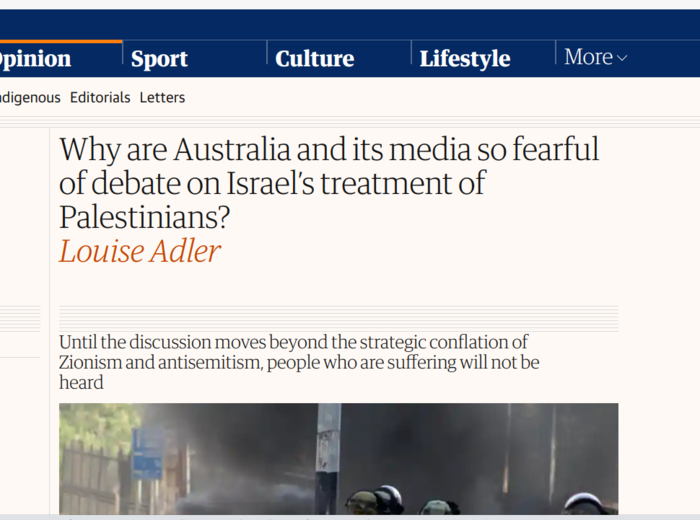“Why are Australia and its media so fearful of debate on Israel’s treatment of Palestinians?”, asks Australia-based journalist Louise Adler in her Oct. 9th Guardian op-ed. Her answer, surprising nobody, is the ‘Israel lobby’. Or, more specifically, as she clarifies later in the article, an orchestrated ‘attack’:
It is clear that if one doesn’t want to endure the endless orchestrated letter writing campaigns, the complaints, the phone calls up and down the management hierarchy, it is best to leave the subject of Israel well alone, which of course is not in the public interest.
That’s right, folks. If you publish articles or op-eds critical of Israel, editors may have to endure sternly worded letters, or even phone calls! Adler writes that she commissioned Australian journalist John Lyons to “examine the impoverished reporting on this benighted region”, and he cited “twenty-three editors, senior journalists and reporters confirmed on the record, to him, that the problem was the Israel lobby.” Though she briefly acknowledges, in the next paragraph, that there’s nothing improper about efforts to lobby on behalf of Israel, she complains – as if she’s the first person to tackle this ‘forbidden’ subject – that “the impact of lobby groups” is not fully recognised.
What impact? She writes that “when Israel’s policies are criticised in the public sphere, the reflexive accusation is antisemitism“. Then, further into the article, she elaborates:
“The conflation of anti-Zionism and antisemitism is a long-term strategy and the effect on the Australian media is obvious. It is a proven way to silence critics, ensure questions remain unanswered and media coverage muted”.
Here, Adler evokes a form of what’s known as the Livingstone Formulation, the argument that when Jews, or the organised Jewish community, complains of antisemitism, they’re doing so in bad faith (as a “strategy”) to silence criticism of Israel and ‘mute’ media coverage. Not only is such a charge ad hominem, in that it attacks the putative motivations of those making the charge of antisemitism, but is so toxic in its imputation of bad motives to Jews that the Equality and Human Rights Commission, in its report about antisemitism in the Labour Party, all but codified the charge as a form of racism.
Adler continues:
The defenders of Israel “right or wrong” share with antisemites a belief that the actions of the state are inextricably bound up with Jewishness.
This ensures that Zionism and antisemitism remain the focus of debate and the issue of Palestinian suffering under an illegal occupation is conveniently ignored. Until we can have a public discussion, which moves beyond that deadlock, it seems inevitable that Palestinian voices will not be heard.
The “defenders of Israel ‘right or wrong’ is of course a straw man, as next to nobody who is pro-Israel believes such a thing.
But, even more problematic is the second part of the sentence, which egregiously conflates two separate ideas: 1.) The antisemitic trope that holds Jews worldwide collectively responsible for the actions of the state of Israel; 2.) the undeniable fact that Zionism is intrinsically linked to Judaism, and that the overwhelming majority of Jews believe Israel plays a part of their Jewish identity.
Alder also ignores the the fact that widely accepted IHRA Working Definition elucidates on the question of where criticism of Israel crosses the line to anti-Jewish racism – an extremely carefully worded document which makes clear that “criticism of Israel similar to that leveled against any other country cannot be regarded as antisemitic”. Moreover, her claim that the occupation is “ignored”, and Palestinian voices silenced, is the opposite of the truth, as media outlets’ coverage of Israel and the Palestinians is obsessive, a dynamic drowns out coverage of far more bloodier conflicts in the region and the world.
Indeed, for Adler to complain of insufficient press attention devoted to the Palestinians, on the pages of the Guardian, the media home of pro-Palestinian coverage and commentary, demonstrates how blind she is to reality.
Ultimately, Adler’s thesis rests on two ideas: That there’s a dearth of Israel coverage in the media, and that the ‘Israel lobby’, through an orchestrated campaign to silence journalists, is largely to blame for this dynamic. Whilst the former is risible, the latter is far more sinister, presenting as ‘brave’, and as ‘speaking truth to power’, well-worn, toxic tropes about Jewish power that have incited antisemitism for ages.





Why does nobody ever talk about the Palestinians????
People like Adler and about a million others with access to the Guardian, NYT, WaPo, CNN talk about nothing else.
As we speak thousands are being dragged from their homes and murdered in Afghanistan. But no Palestinians involved, so – no story.
Exactly.